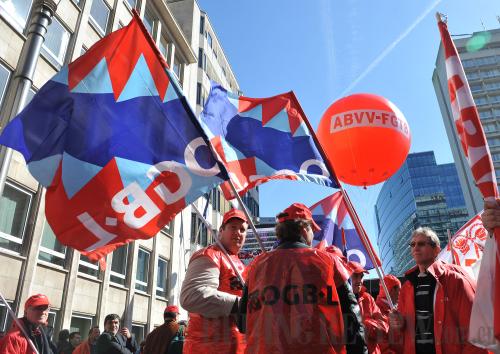|
 |
|
RETRENCHMENT PROTESTS: Europeans hold banners on March 24 in Brussels to demonstrate against fiscal austerity policies (WU WEI) |
 While there has long been anticipation of Portugal's need for an economic bailout, the country's formal request on April 6 still dealt a sobering blow to the current crisis in the EU. Portuguese banks are already heavily reliant on assistance from the European Central Bank (ECB). But as the markets demand ever higher returns on new government debt instruments, and with the government's recent resignation fueling market fears, Portugal had little recourse but to follow in the steps of Greece and Ireland and turn to an EU bailout. While there has long been anticipation of Portugal's need for an economic bailout, the country's formal request on April 6 still dealt a sobering blow to the current crisis in the EU. Portuguese banks are already heavily reliant on assistance from the European Central Bank (ECB). But as the markets demand ever higher returns on new government debt instruments, and with the government's recent resignation fueling market fears, Portugal had little recourse but to follow in the steps of Greece and Ireland and turn to an EU bailout.
Since the start of the financial crisis, Europe has been plagued by overwhelming problems of huge budget deficits, low growth and savage cuts on spending. This has undoubtedly been the most severe test the euro zone has confronted since its inception. With the volatility the euro has experienced over the past year, and no clearly mapped solution to the crisis, the looming question remains: What does the future hold for the decade-old European currency project?
The EU has been scrambling to find solutions to contain the ripple effects of the current sovereign debt crisis. At a summit in Brussels in March this year, EU leaders underwent discussions to adopt a comprehensive strategy for stabilizing the euro zone, and an agreement was reached to extend the European Financial Stability Fund (EFSF) to 500 billion euros ($722 billion)—effective lending capacity of 440 billion euros ($636 billion)—with triple-A status and establish a permanent European Stability Mechanism by 2013. Significantly, as a clear indication of fears Greece might default, interest rates on loans Greece has taken out were reduced by 1 percentage point.
When EU finance ministers met in Hungary this month, Portugal was clearly top of the agenda. Despite these measures, overall sentiment about the crisis remains negative for a number of reasons.
First, there appears to be no end to the crisis in sight. The bailout of Greece was intended to prevent contagion and a systemic crisis. But in November last year, Ireland went under swiftly but was subsequent bailed out to salvage its situation. Yet, now Portugal is in need of aid. The domino effect of the crisis has stretched the limits of the amount of debt eurozone member countries are willing to shoulder.
With countries like Finland and Germany facing upcoming elections, their leaders are not in the best of positions to convince their populations to continue bailing out fellow EU members. EU leaders have to tread a delicate balance between pandering to domestic demands and adopting a long-term view by taking measures that would benefit the euro zone in the long haul.
More importantly, the bailouts have only offered short-term relief to markets, by providing liquidity and staving off insolvency. There remains the possibility countries like Greece might default on their debt, setting off a second wave of crisis. The only feasible long-term solution to the crisis is economic growth to enable the indebted countries to pay off their mounting debt. Just as an upward economic spiral sets in motion a positive cycle, the EU is now confronted with a negative downward spiral, as the loans lock bailout recipient countries into austerity measures for years, and paying off this debt adversely impacts the very growth needed to pay off the debt.
The bailout of Portugal is relatively light, estimated at 80 billion euros ($116 billion), compared to 85 billion euros ($123 billion) for Ireland and 110 billion euros ($159 billion) for Greece. But there is still the lingering worry Spain might be next. Spain has an unemployment rate of more than 20 percent, the highest in the EU, and is struggling to deal with a banking crisis and the collapse of its property bubble.
Spain also has an economy that is far larger—Greece, Ireland and Portugal each account for approximately 2 percent of the eurozone economy, while Spain makes up about 10 percent. A bailout of Spain would likely stretch the EFSF considerably. In addition, Spain is one of the major contributors to the EFSF (Germany contributes 27 percent, France 20 percent, Italy 18 percent and Spain 12 percent) and its bailout would exacerbate the problem of fewer and fewer countries footing a bailout bill that keeps growing. There is also fear that further bailouts might encourage economic laxity in profligate governments.
Second, it has proven difficult to formulate policies and actions widely beneficial across the euro zone and able to address the problems of member countries on different speeds of recovery. For instance, the ECB raised its interest rates on April 7 for the first time since July 2008 due to prolonged concerns about inflation. While this is no doubt favorable for stronger economies like Germany, it is apparent countries like Greece, Ireland and Portugal that are struggling with deficit and debt crises would be negatively affected.
| 